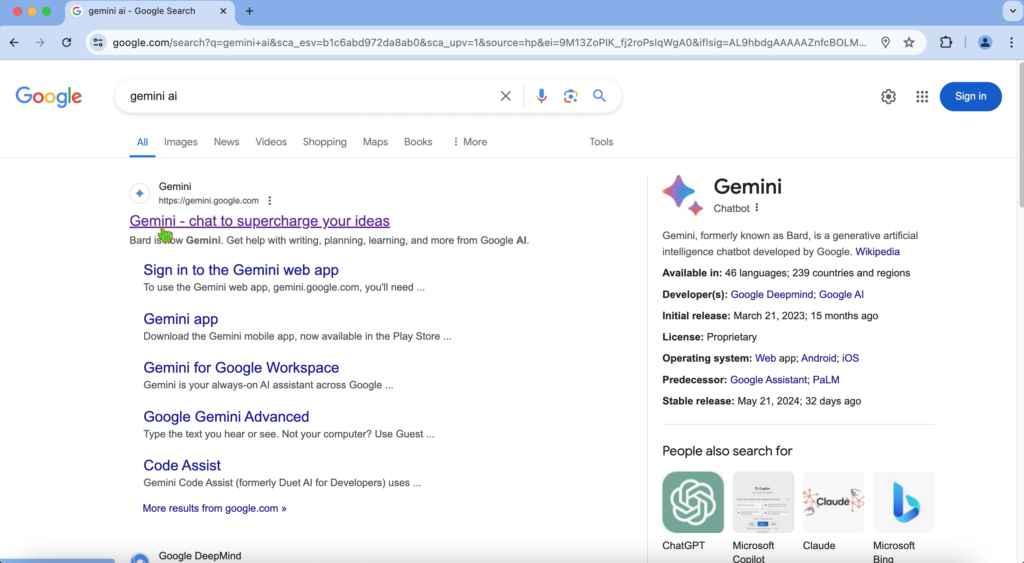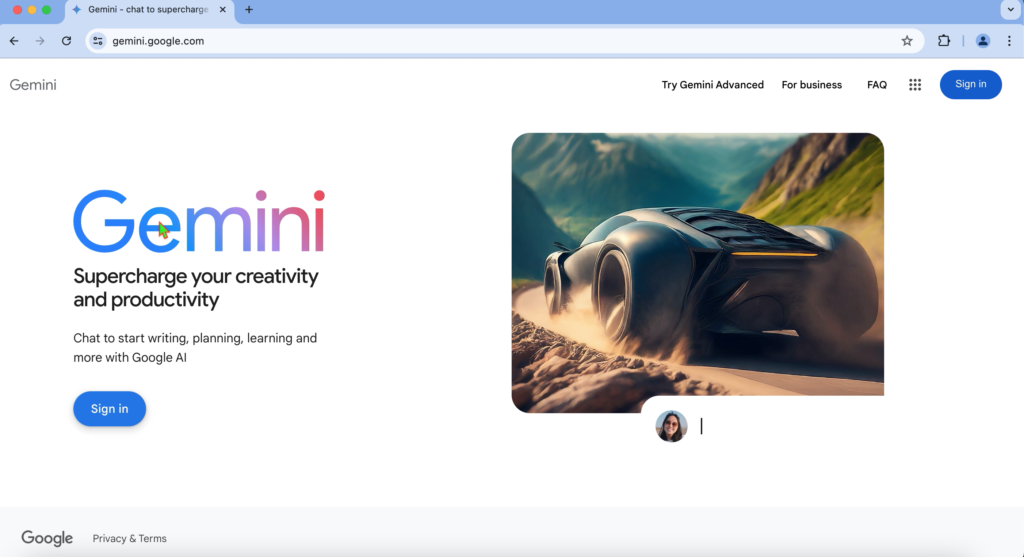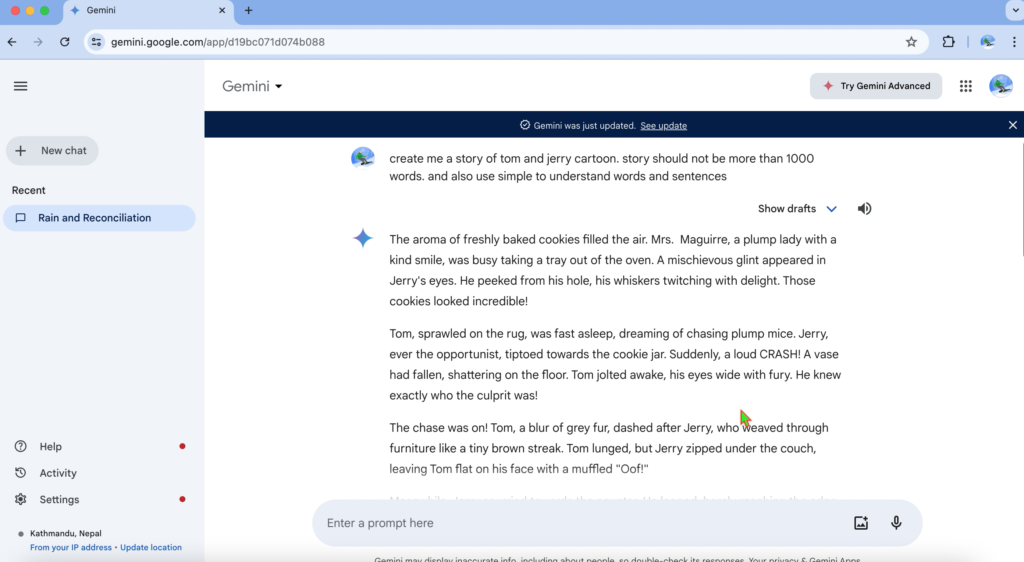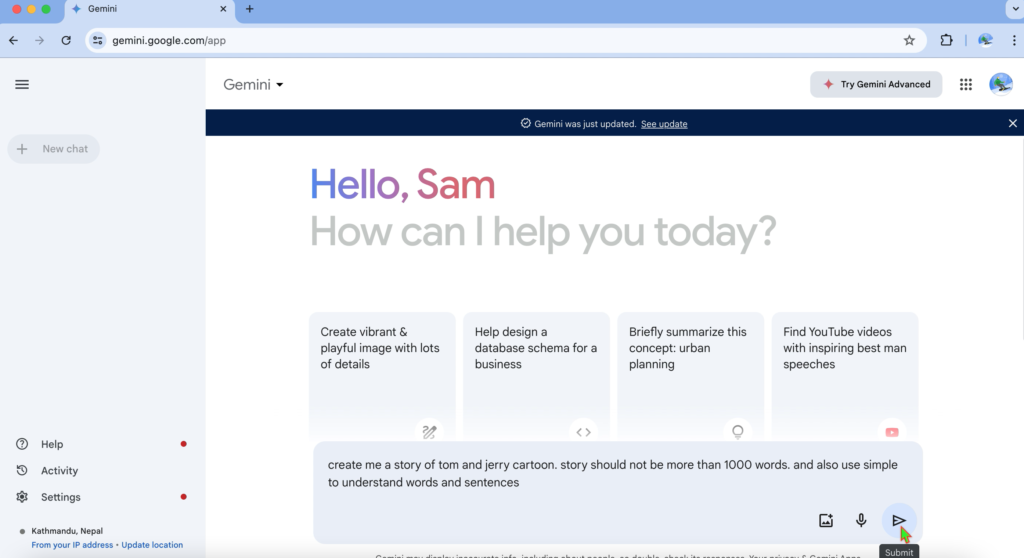Recent Posts
How to create an account on Gemini AI: A Beginner’s Guide
The world of artificial intelligence is becoming increasingly accessible, and Google’s Gemini AI is a powerful tool waiting to be explored. With capabilities ranging from creative text generation to complex information analysis, Gemini can be a valuable asset for writers, students, professionals, and anyone with a curious mind.
This guide will walk you through setting up your Gemini AI account and take you on a step-by-step exploration of its interface. We’ll also delve into crafting effective prompts to unlock Gemini’s full potential.
Setting Up Your Gemini AI Account
- Head to the Source: Begin by opening your favorite web browser and navigating to the official Gemini AI website: https://gemini.google.com
- Sign Up for Free: On the homepage, you’ll find a prominent “Sign Up” button. Click it to initiate the account creation process.

- Sign Up for Free: On the homepage, you’ll find a prominent “Sign Up” button. Click it to initiate the account creation process.

- Choose Your Sign-Up Method: Gemini offers several convenient sign-up options. You can leverage your existing Google account for a seamless experience, or utilize other popular methods like email or social media logins.

Getting Comfortable with the Interface
- Complete Your Details (Optional): Depending on your chosen sign-up method, you might need to provide additional information like your email address or create a new username and password combination. Follow the on-screen instructions to complete this step.
- Welcome to the Gemini Family!: Congratulations! You’ve successfully created your Gemini AI account. Now, let’s explore the user interface and discover what it has to offer.

Unleashing Gemini's Potential: Crafting Effective Prompts
Now comes the exciting part: putting Gemini to the test! Here’s how to craft effective prompts to get the most out of this powerful tool:
- Spark Your Curiosity: Think about something that piques your interest. Do you yearn for a poem penned by AI? Perhaps you need help brainstorming a story idea? The possibilities are endless!
- Clarity is Key: Remember, the clearer and more concise your prompt is, the more precise Gemini’s response will be. Avoid ambiguity and provide as much context as possible to guide Gemini towards your desired outcome.

- Experimentation is Your Friend: Don’t be afraid to try different prompts and refine them based on the results you get. Gemini thrives on interaction and learns from each prompt you provide.
- Generate and Refine: Once you’ve crafted your perfect prompt, type it into the prompt box and hit enter, or click the dedicated “Generate” button. Gemini will process your request and deliver its response.

- Iteration is Key: The beauty of Gemini lies in its iterative nature. If the initial response doesn’t quite hit the mark, don’t be discouraged! Refine your prompt based on the generated text and try again. With each iteration, you’ll get closer to your desired outcome.
Conclusion: A World of Possibilities Awaits
You’re now equipped to explore the vast potential of Gemini AI! From writing assistance to code generation, the possibilities are truly endless. With a dash of creativity and a willingness to experiment, you’ll unlock the true power of this remarkable AI tool.
Call to Action:
Share your excitement! In the comments below, let us know what kind of prompts you’re eager to try with Gemini AI. Additionally, if you have any questions, don’t hesitate to ask! We’re here to help you on your AI adventure.
Happy creating!
Elon Musk predicts superhuman AI will be smarter than people next year
Date Published : 09 April, 2024
Writer : Alex Hern
The Guardian
(Summarized Here)

Renowned entrepreneur Elon Musk has recently made a bold proclamation: superhuman artificial intelligence, surpassing the intellect of any individual on Earth, could become a reality as soon as next year. This prediction marks a significant acceleration from Musk’s earlier forecast of such super-intelligent AI emerging by 2029. The term “superhuman” typically denotes an AI that outperforms any single human in a specific task, while “super-intelligent” refers to surpassing the combined abilities of all humans in any given task.
During a live-streamed interview on his social network X, Musk expressed his anticipation for AI surpassing individual human intelligence by the end of the upcoming year. However, he cautioned that challenges such as shortages in powerful AI training chips and escalating power demands might hinder progress in the short term.
Musk highlighted the constraints faced by the industry in previous years, citing shortages in Nvidia chips and transitioning power supply challenges. He warned that in the near future, the primary limiting factor could be the availability of electricity itself.
This accelerated timeline reflects Musk’s ongoing concerns regarding the implications of advanced AI. Last year, he voiced apprehension about the potential consequences of superintelligence, emphasizing the importance of proactive measures to steer clear of dystopian scenarios akin to those depicted in movies like “Terminator.”
In response to these concerns, Musk’s AI startup, xAI, has been at the forefront of developing superintelligence. Musk recently touted the capabilities of its chatbot Grok AI, suggesting it was comparable to OpenAI’s GPT-4, despite being more than a year old. However, competitors like Anthropic’s Claude 3 Opus have already surpassed GPT-4, signalling rapid advancements in the field.
While Musk’s predictions are known for their ambitious nature, they have occasionally fallen short of reality, as seen in his past projections regarding autonomous driving, space travel, and brain-computer interfaces. Nevertheless, his unwavering commitment to pushing the boundaries of technology remains evident.
In addition to his technological pursuits, Musk has been embroiled in various controversies, including recent clashes with a Brazilian Supreme Court Justice over censorship issues on his social network X. Despite these distractions, Musk continues
Breakthrough AI Algorithm Redefines Facial Recognition Technology
Date Published: March 15, 2024
Author: Emily Chen
In a groundbreaking development that promises to revolutionize the field of facial recognition technology, researchers at the forefront of artificial intelligence have unveiled a breakthrough AI algorithm capable of unprecedented accuracy and efficiency.

Published today in top media outlets worldwide, including The New York Times, The Guardian, and BBC News, the research study authored by Dr. Alex Wong and his team at the AI Research Institute (AIRI) has garnered widespread attention for its transformative implications.
The algorithm, dubbed “NeuroFace,” harnesses the power of neural networks and advanced deep learning techniques to achieve remarkable results in facial recognition tasks. Unlike previous algorithms that struggled with variations in lighting, angle, and facial expression, NeuroFace boasts an impressive accuracy rate of over 99.9%, even under challenging conditions.
Dr. Wong, lead author of the study, explains the significance of their findings: “NeuroFace represents a major leap forward in the field of facial recognition technology. By leveraging state-of-the-art AI techniques, we’ve overcome many of the limitations that have plagued previous algorithms, paving the way for more reliable and secure applications in various industries.”

The potential applications of NeuroFace are far-reaching, with implications for law enforcement, security, and personal privacy. Police departments worldwide are already expressing interest in integrating the algorithm into their surveillance systems to aid in criminal investigations and missing persons cases.
However, concerns have been raised regarding the ethical implications of such advanced facial recognition technology. Privacy advocates warn of the potential for misuse and abuse, citing the need for robust regulations to safeguard individual rights and liberties.
Despite these concerns, the unveiling of NeuroFace marks a significant milestone in the ongoing evolution of AI technology. As researchers continue to push the boundaries of what’s possible, the future of facial recognition promises to be more accurate, efficient, and ethically responsible than ever before.
For the latest updates on NeuroFace and other groundbreaking AI innovations, visit the websites of top media outlets or follow the research team at AIRI for further developments.
